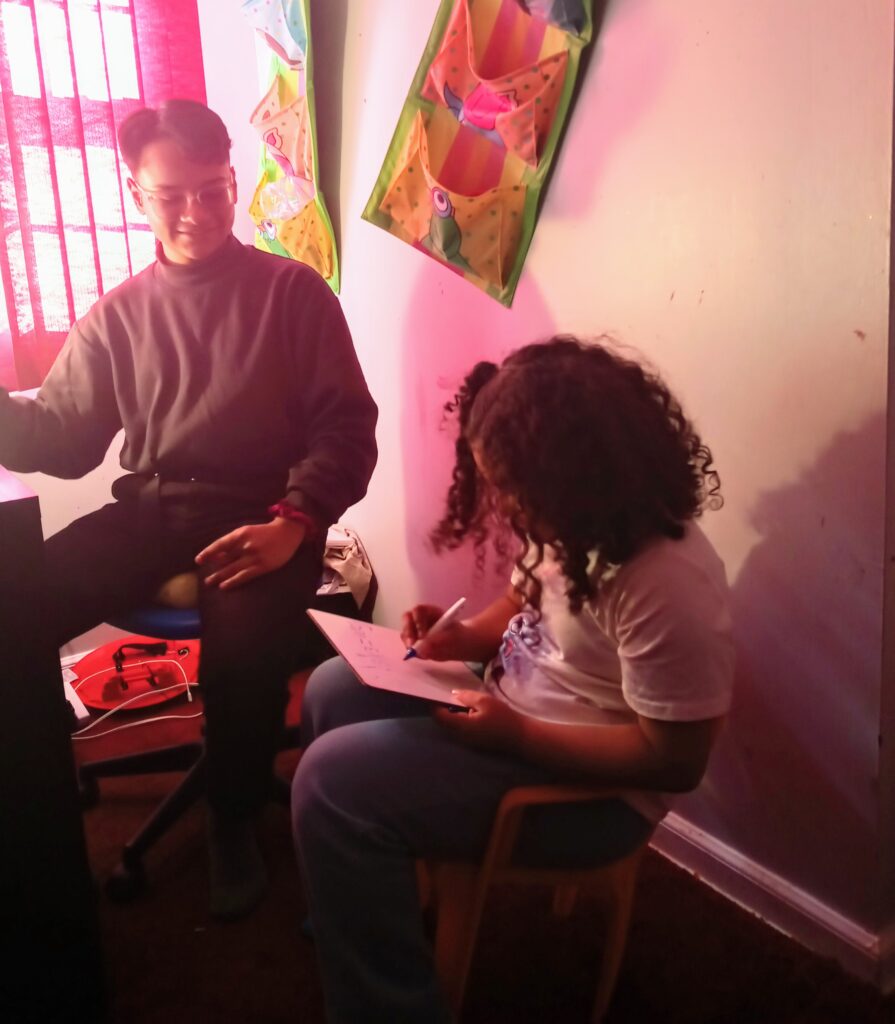
Teaching’s Trials
Submitted by Rob Kinch
“My parents are often busy with work and trying to provide my siblings and me with basic necessities such as food, school supplies, and clothes. As the oldest kid in the house, I am responsible for pretty much everything my little sisters do. What’s the big deal in helping them with their own work?” It seems such a formidable task for a 9th grader. Yet, Rahway High School Freshman Chidinma Chikezie is by no means daunted. “I feel it’s simply the right thing to do.”
As every household adjusts to the changes in daily life necessitated by the current pandemic, many discover themselves in situations they heretofore could never have envisioned. Teenagers in the Rahway community have been no exceptions. As all the vestiges of ‘school’ as they know it are replaced with the concept of ‘virtual learning’, families with younger children are confronted with an entirely new set of challenges. The overwhelming demands of balancing work and home do not always afford parents the opportunity or luxury of sitting beside their little ones at a computer helping them to maneuver through their daily lessons. That responsibility now often falls on big brother or sister who frequently has his or her own academic requirements to address.
Many high school students now discover themselves in the new role of ‘teacher’ offering support, guidance, and tutoring services as needed on demand. However, with all the students interviewed, not one begrudged their new role as surrogate ‘instructors’. The experience of helping their siblings or cousins, knowing that they were in turn helping their families, was for them a reward in itself. Freshman Giovanni Jean is helping his 10th grade sister Maya because, as he explains, “I want to help my sister in anything she has trouble in, especially school.” Junior Manny Mendez shares Giovanni’s dedication to his family as he explains, “I really care about my cousin Leilani’s grades. She’s in 9th grade so, whenever I can, I help her out with any work she has.” This, being a noticeably shared sentiment, simply shines a bright light on the caring and concern for family embraced by the district’s students.
Fortuitously, the teaching experience has also helped students recognize abilities and strengths they never knew they had. Sophomore Kayla Dobrzyn, who is now taking responsibility for the academic responsibilities of her baby sister, admits, “It’s been a little tricky! Since it’s just pre-k, it hasn’t been too difficult. I’m meeting the challenge of getting her focused to accomplish the task. I’ve learned to be patient and understanding and have discovered new ways to keep her calm and motivated.” Giovanni Jean has realized “not to give up if your sibling is having trouble understanding you.” He has discovered it best “to just take your time and don’t speak too fast!” Chidinma Chikezie finds she can “stay calm and be patient,” and offers, “They are just like you, a student trying to get an education. Be selfless.”
However, as the new crop of ‘student teachers’ navigate their path through the uncharted waters of ‘virtual education’, each is quick to learn that it is not always smooth sailing. There are challenges a’plenty! Sophomore Kevin Rivera has found significant obstacles in “teaching someone something they have no knowledge of, along with two adults who have no knowledge of computers or connectivity issues.” The only challenge Giovanni Jean faces is knowing “how my sister is taking in the information I’m giving her because I don’t know if she will forget the next day or if she’s just not paying attention.” Sound familiar classroom teachers?
Chidinma Chikezie also echoes a challenge shared now by parents and teachers alike as they help their own children with their schoolwork. “Sometimes it’s hard not to get frustrated with my siblings if they don’t get something right the first time! There are days when I just want to keep to myself and shut out the rest of the world, but I know I have to force myself from thinking negatively and try my best to support them. As an educator, you’re still family and you don’t want them to see you in a bad light. You want them to keep looking up to you.
RHS English teacher Sonia Saadeh can definitely relate and offers some empathetic encouragement. “Chidinma, I completely understand your frustration! It’s so hard to have to re-teach something because that takes so much time, and who wants to spend more time teaching the same thing? I have a daughter in the second grade and she is already telling me she is bad at math. Whenever she has math homework, she begins to react emotionally before she even turns her chromebook on. As an educator, I want her to get to work and attack the assignment with passion and confidence, but as a parent, my heart breaks to see her feeling negatively about school. Whenever I feel frustrated with my daughter or my students, Chidinma, what works for me is to think about all the times I get frustrated because I don’t understand something or have to do something I don’t want to. I speak openly and honestly with my daughter and I let her know I understand how she’s feeling, that I’ve been there.” Ms. Saadeh cites that it makes her daughter “feel supported” and, happily, “It works every time!”
And now, after having dipped their toes into the pedagogical pool, has the experience afforded our novice educators any insight into the challenges faced by their own classroom teachers? Kevin Rivera very comically points out that, “it feels more like a role in a movie rather than teaching: having to keep a child’s attention and be there and act like you want to be there!” Manny Mendez recognizes that his teachers “go through a lot.” “I found new respect for them; they have to go through all this: multiple classes, multiple students and they have to manage it all on their own!!” Pre-k ‘teacher’ Kayla Dobrzyn confirms. “It definitely shed some light on the challenges my own teachers face, such as students being frustrated, impatient, unmotivated, and sleepy. It puts such a burden on them not to reciprocate with the same emotions!” Giovanni Jean notes, “Teachers don’t have a lot of time to teach their students things they don’t understand; I had a whole day to teach my sister what she missed or didn’t comprehend.” On a philosophical note, Chidinma offers, “Being a teacher isn’t easy; there are always ups and downs. You have to figure out ways to make the best of your situation.”
As school districts and teachers continue to move forward ensuring that each of their students receives consistent academic instruction and rigor, whether in or outside of the traditional classroom, the opportunities for learning present themselves in various forms. For many of Rahway’s students, the responsibilities of assuming the role of ‘educator’ to another has taught them lessons not found in a textbook. Parents within the community have learned how caring, responsible, and devoted to family their sons and daughters are. Little brothers, sisters, and cousins now recognize that they have someone closer to their age on whom they can rely. However, one lesson definitely learned by all is that coming to the aid and support of a family member is not just a necessity (as is often the case), but a gift that comes from the heart as well.


